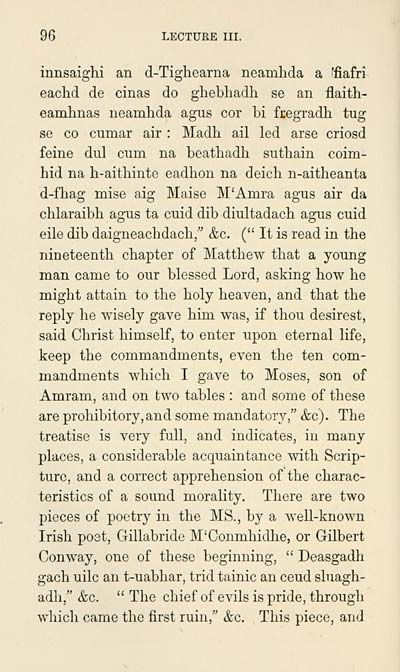Blair Collection > Celtic gleanings, or, Notices of the history and literature of the Scottish Gael
(108)
Download files
Complete book:
Individual page:
Thumbnail gallery: Grid view | List view

96 LECTURE III.
innsaighi an d-Tighearna neamhda a ^fiafri
eachd de cinas do ghebhadh se an flaith-
eamhnas neamhda agus cor bi fregradh tug
se CO cumar air : Madh ail led arse criosd
feine dul cum na beathadh sutbain coim-
hid na h-aitbinte eadbon na deicb n-aitheanta
d-fhag mise aig Maise M'Amra agus air da
cblaraibh agus ta cuid dib diultadacb agus cuid
eile dib daigneacbdacb/' &c. (" It is read in the
nineteenth chapter of Matthew that a young
man came to our blessed Lord, asking how he
might attain to the holy heaven, and that the
reply he wisely gave him was, if thou desirest,
said Christ himself, to enter upon eternal life,
keep the commandments, even the ten com-
mandments which I gave to Moses, son of
Amram, and on two tables : and some of these
are prohibitory, and some mandatory," &c). The
treatise is very full, and indicates, in many
places, a considerable acquaintance with Scrip-
ture, and a correct apprehension of the charac-
teristics of a sound morality. There are two
pieces of poetr}^ in the MS., by a well-known
Irish poet, Gillabride M'Conmhidhe, or Gilbert
Conway, one of these beginning, " Deasgadh
gach uilc an t-uabhar, trid tainic an ceud shiagh-
adh," &c. " The chief of evils is pride, through
which came the first ruin," &c. This piece, and
innsaighi an d-Tighearna neamhda a ^fiafri
eachd de cinas do ghebhadh se an flaith-
eamhnas neamhda agus cor bi fregradh tug
se CO cumar air : Madh ail led arse criosd
feine dul cum na beathadh sutbain coim-
hid na h-aitbinte eadbon na deicb n-aitheanta
d-fhag mise aig Maise M'Amra agus air da
cblaraibh agus ta cuid dib diultadacb agus cuid
eile dib daigneacbdacb/' &c. (" It is read in the
nineteenth chapter of Matthew that a young
man came to our blessed Lord, asking how he
might attain to the holy heaven, and that the
reply he wisely gave him was, if thou desirest,
said Christ himself, to enter upon eternal life,
keep the commandments, even the ten com-
mandments which I gave to Moses, son of
Amram, and on two tables : and some of these
are prohibitory, and some mandatory," &c). The
treatise is very full, and indicates, in many
places, a considerable acquaintance with Scrip-
ture, and a correct apprehension of the charac-
teristics of a sound morality. There are two
pieces of poetr}^ in the MS., by a well-known
Irish poet, Gillabride M'Conmhidhe, or Gilbert
Conway, one of these beginning, " Deasgadh
gach uilc an t-uabhar, trid tainic an ceud shiagh-
adh," &c. " The chief of evils is pride, through
which came the first ruin," &c. This piece, and
Set display mode to: Large image | Transcription
Images and transcriptions on this page, including medium image downloads, may be used under the Creative Commons Attribution 4.0 International Licence unless otherwise stated. ![]()
| Early Gaelic Book Collections > Blair Collection > Celtic gleanings, or, Notices of the history and literature of the Scottish Gael > (108) |
|---|
| Permanent URL | https://digital.nls.uk/76269932 |
|---|
| Description | A selection of books from a collection of more than 500 titles, mostly on religious and literary topics. Also includes some material dealing with other Celtic languages and societies. Collection created towards the end of the 19th century by Lady Evelyn Stewart Murray. |
|---|
| Description | Selected items from five 'Special and Named Printed Collections'. Includes books in Gaelic and other Celtic languages, works about the Gaels, their languages, literature, culture and history. |
|---|

